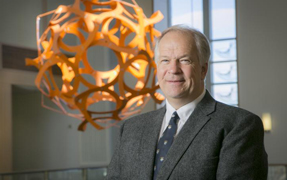JBO to Host Hot Topics in Biomedical Optics Webinar Series

BELLINGHAM, Washington, USA — Beginning 15 June, SPIE, the international society for optics and photonics, will host a series of monthly webinars sponsored by the Journal of Biomedical Optics (JBO). The JBO Webinar Series: Hot Topics in Biomedical Optics will showcase leaders in the biomedical optics field discussing the latest research, collaborations, and discoveries.
Each webinar will feature three speakers, followed by a live Q&A panel discussion. The webinars will be moderated by JBO Editor-in-Chief Brian Pogue, the MacLean Professor of Engineering at Dartmouth, as well as associate editors and special section editors. Registration is free.
Each webinar will be streamed at the times listed below, and recordings of the webinars will be available at a later date.
• Monday, 15 June, 12 pm-1:30 pm EDT: "Artificial Intelligence & Machine Learning in Biomedical Optics."
Speakers: Mark Anastasio, University of Illinois at Urbana-Champaign; Frédéric Leblond, Polytechnique Montréal; and Baowei Fei, University of Texas, Dallas and Southwestern Medical Center.
Moderators: Brian Pogue and Behrouz Shabestari, National Institute of Biomedical Imaging and Bioengineering.
• Monday, 20 July, 12 pm-1:30 pm EDT: "Wearable, Implantable, Mobile, and Remote Biomedical Optics & Photonics."
Speakers: Babak Shadgan, University of British Columbia; Jessica Ramella-Roman, Florida International University; and Darren Roblyer, Boston University.
Moderators: Brian Pogue, Stephen Chad Kanick, Lark Health, and Amir Gandjbakhche, National Institute of Child Health and Human Development.
• Monday, 17 August, 12 pm-1:30 pm EDT: "Photoacoustic Imaging: The Next Generation."
Speakers: Muyinatu A. Lediju Bell, Johns Hopkins University; Xueding Wang, University of Michigan; and Manojit Pramanik, Nanyang Technological University.
Moderators: Brian Pogue, Lihong Wang, Caltech, and Paul Beard, University College London.
"One of the central tenets of doing good science is to have an exchange of ideas between researchers," noted Pogue. "At this challenging time, when travel is limited and in-person conferences are on pause, we are missing these critical interactions. The Journal of Biomedical Optics is the oldest and most trusted conduit for us to share our work in publication form, and these webinars are a natural extension of this. We hope to give a voice to leading researchers, and to provide a discussion forum on key topics. The subjects have been chosen to highlight areas that we know are important to our readers, and the speakers and moderators are all experts in these biomedical optical technologies."
To register and for more information please visit the JBO Webinar Series page.
About SPIE
SPIE is the international society for optics and photonics, an educational not-for-profit organization founded in 1955 to advance light-based science, engineering, and technology. The Society serves more than 255,000 constituents from 183 countries, offering conferences and their published proceedings, continuing education, books, journals, and the SPIE Digital Library. In 2019, SPIE provided more than $5.6 million in community support including scholarships and awards, outreach and advocacy programs, travel grants, public policy, and educational resources. www.spie.org
________________________________________
Contact:
Daneet Steffens
Public Relations Manager
daneets@spie.org
+1 360 685 5478
@SPIEtweets



